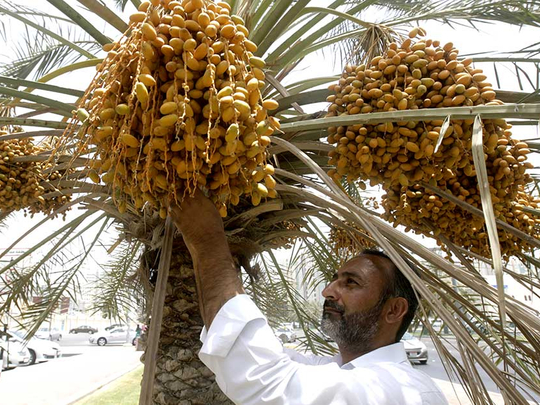
Dubai: Date palm trees have a long and fertile history with humans, which is evident from findings such as the oldest discovered date seeds on Delma island in the emirate of Abu Dhabi. Discovered in 1998, the oldest seed dates back to 5110BC and the second oldest goes back to 4670BC according to radiocarbon tests.
Because there was no evidence of cultivation of date palm trees in the region at that time, it is believed that the seeds came from traders. In fact, dates and other products created from the fruit and tree were traded widely in the ancient world, even as the date palm tree was being cultivated in countries ranging from the Indus Valley (now Pakistan) to Mesopotamia (now Iraq), the Nile Valley, Eastern Mediterranean and the Horn of Africa.
The date palm trees and their fruit were revered in these ancient cultures; however, it gained the highest regard and recognition within Arab Islamic culture.
Dates were Prophet Mohammad’s (PBUH) favourite fruit and this is evident in the Quran, which mentions them 26 times, referring to them as ‘God’s Bounty’.
DATE PALM TREE USES
Every part of this essential tree has been put to good use for centuries in the region — from forming the main framework for traditional houses to using its leaves to make mats, baskets and fans to using the seeds to make soap and kohl eyeliner.
Trunks:
Support for tents and for framework of dwellings
Leaves:
Flooring of dwellings made by woven palm leaf strips
Common usage is for the making of mats, baskets and fans
Branches:
Roofs are made by binding branches with ropes
Used to make sections of small fishing boats
Seeds:
Used for making soap and kohl eyeliner
Fruit:
Syrup is extracted from the fruit
Nature’s candy is full of natural sugars
Dates are rich in fibre, potassium and amino acids, and a good food for the health-conscious
Dates used to be part of an Arab’s diet as this ‘nature’s candy’ was easy to transport and did not require refrigeration, according to a dietitian.
She said this energy-boosting fruit helps stop the craving for sweets and is good for those who are obese or overweight.
“It’s full of natural sugars and much healthier,’ she said. The natural sugars include fructose, glucose and sucrose.
But she notes that diabetics should eat just eat two or three dates at a time.
The fruit has very low calories (about 23 calories in a single date) and is a good food for the health-conscious.
Lubna Surya, dietitian with Aster Clinic, said the fibre in the fruit helps control bad cholesterol. According to the American Cancer Society, fibre (about 20g to 35g) is good for your body as it helps eliminates toxins from your body.
Amazingly, dates are also full of other good things. It is a treasure house of B-complex vitamins, which are essential for the functioning of your metabolism.
Dates also have 20 kinds of amino acids which help ease the digestive process.
Their rich potassium content helps reduce the risk of stroke or coronary heart disease and helps bring down high blood pressure.
The selenium in dates is a good anti-oxidant.
In Ramadan, Muslims start and end their fast with dates.
A perfect food
Calories: very low, suitable for the health-conscious.
Fibre: lowers bad cholesterol and cuts craving for sweets, eliminates toxins.
High in potassium content: which helps cut the risk of stroke and coronary heart disease.
Host of B-complex vitamins: essential for the function of metabolism.
Anti-oxidants: reduce inflammation of arteries.
Amino acids: 20 different kinds, which ease digestive process.
Iron: good for the anaemic.
Pregnancy: strengthens uterine muscles and helps dilation during delivery.












